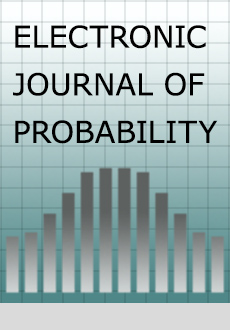Abstract
Let $G=(G_{1},G_{2})$ be a Gaussian vector in $R^{2}$ with $E(G_{1}G_{2})\ne 0$. Let $c_{1},c_{2}\in R^{1}$. A necessary and sufficient condition for the vector $((G_{1}+c_{1}\alpha )^{2},(G_{2}+c_{2}\alpha )^{2})$ to be infinitely divisible for all $\alpha \in R^{1}$ is that $$ \Gamma_{i,i}\ge \frac{c_{i}}{c_{j}}\Gamma_{i,j}>0\qquad\forall\,1\le i\ne j\le 2.\qquad(0.1) $$ In this paper we show that when (0.1) does not hold there exists an $0<\alpha _{0} < \infty $ such that $((G_{1}+c_{1}\alpha )^{2},(G_{2}+c_{2}\alpha )^{2})$ is infinitely divisible for all $|\alpha |\le \alpha _{0}$ but not for any $|\alpha | > \alpha _{0}$.
Citation
Jay Rosen. Michael Marcus. "Existence of a critical point for the infinite divisibility of squares of Gaussian vectors in $R^2$ with non--zero mean." Electron. J. Probab. 14 1417 - 1455, 2009. https://doi.org/10.1214/EJP.v14-669
Information





